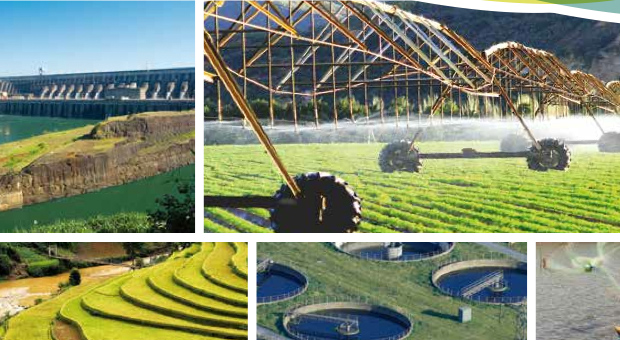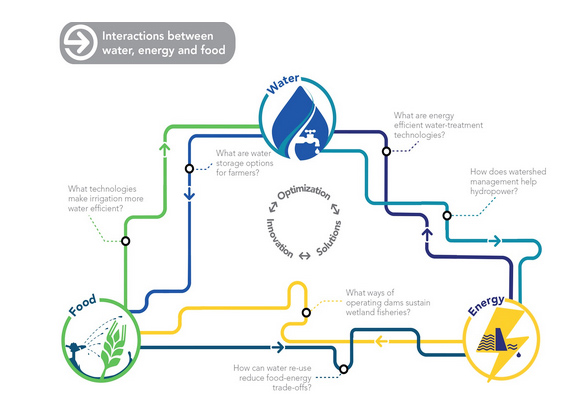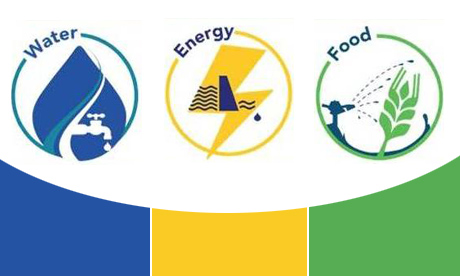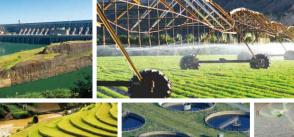
Nexus Dialogue on Water Infrastructure Solutions
Building Partnerships for Innovation in Water, Energy and Food Security.
Anthropocene is used to explain the influence of human activity on the Earth’s ecosystems. Will Steffen of the Australian National University Climate Change Institute reminded us that civilizations are not guaranteed to last forever – e.g. the fall of the Romans and the Mayans. Learning from past experiences and best practices, improving integration and collaboration to identify sustainable solutions are within arm’s reach. We have the tools and means to consider the implications of our actions on the environment and strive to position ourselves on a greener and more sustainable trajectory. It is that great thing about people; we have the capacity to change!
Projections indicate that by 2050, the world population is expected to reach 9 billion people, increasing water demands (55%) to meet increasing energy (80%) and food (60%) needs. Recently, emphasis has been put on the value of addressing the complex relationship between water, energy and food – the Water (W), Energy (E) and Food (F) Nexus. With an ever more pressing need for water, energy and food, careful planning and management of such resources, especially water, has never been a greater priority.
[© IUCN WATER Infographic design: Carolyne Daniel, Zoi Environment Network]
The WEF Nexus addresses how one resource affects the other, where water is perhaps the most important resource; unlike energy and food, water cannot be created or substituted. For example, most energy production sites require large amounts of water for cooling. Water is used for hydropower generation, representing 20% of the world’s electricity and acknowledged as the main energy source for more than 30 countries. Agriculture, for obvious reasons, demands a substantial amount of water, accounting for more than 70% of global water withdrawals.
In a joint initiative, the International Union for Conservation of Nature (IUCN) and the International Water Association (IWA) launched the Nexus Dialogue on Water Infrastructure Solutions in 2013 with the purpose of building partnerships for innovation in water, energy and food security. This initiative helps realise the need for new or improved water infrastructure and technology solutions and its associated financing and institutions, developed as a result of the Bonn Nexus Conference in 2011. One of the objectives in Bonn discussed launching concrete initiatives to address the WEF Nexus in a coherent and sustainable way.
The dialogue is essentially a call to action to those leading transformations in water infrastructure (both built and natural) planning, financing and operation. It provides a forum for sharing experiences, lessons, tools and guidelines on how water infrastructure and technologies can address nexus challenges. It has been established to build a common understanding of innovative planning, management and operational approaches that provide shared benefits across the nexus. A perfect example of this was the Regional Workshop held in Nairobi in May 2013, bringing professionals in the water, energy and food sectors together to facilitate collaboration on nexus issues, and in this case with examples from the Niger, Pangani and Vaal River Basins. Claire Warmenbol of IUCN described the interaction among attendees in her blog, “The Realities of the Nexus”, which essentially illustrates what the Nexus Dialogue is.
According to Ger Bergkamp, Executive Director of IWA, the Bonn Conference highlighted the:
“increased interest in investing in water infrastructure in different parts of the world because of concerns around water storage, water supply and flood protection for example, as well as food security, population growth and the need for climate change adaptation. In addition to thinking about water infrastructure, however, [participants] were interested in understanding what the broader set of options and technologies might be that work well across the water, food and energy sectors. For example, investments in water reuse to provide an additional water source for industry and agriculture in water scarce areas.”

Related resources
While there are several approaches already addressing concerns of meeting current and future water, energy and food needs, the Nexus Dialogue approaches water, energy and food challenges within an integrated framework, blending together the experiences and ideas of innovative professionals in farming, energy-production, natural resource management and engineering, and using it to highlight infrastructure and technology that can help engage in relevant challenges of the WEF Nexus. “We want to learn what infrastructure and technology in the food and energy sectors are being used to improve production while still being able to secure water for other sectors. We want to see how irrigation storage can be used to maximise energy generation and food production, but also how water supply to urban areas is sustained through investment in natural infrastructure in upstream catchment areas. Water, food and energy communities of practice are moving towards a discourse that understands that the investment in one area has knock on effects on the others, so there needs to be joint thinking in identifying and applying solutions.”
The dialogue will culminate in a 2014 International Conference to meet the integrated challenge of water, energy and food security.
You can engage with the Nexus Dialogue and submit contributions through their website.
By joining it on social media – Twitter, Facebook and Linkedin – you will stay up-to-date on new submissions, news items, videos, and activities taking place.







